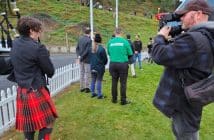Good Local Media exclusively revealed last month that Sanctuary Mountain Maungatautari’s funds would not get it beyond August. Chris Gardner looks at one of the solutions.
Sanctuary Mountain Maungatautari. Photo: Hamilton & Waikato Tourism.
Sanctuary Mountain Maungatautari general manager Helen Hughes is tackling the operation’s cash crisis head on with a five-year plan to make the world’s largest predator-proof fence self-funded.
Last month Hughes revealed the $5000 a day 3363ha operation was at risk of closure by the end of next month because it had been “going backwards in terms of revenue for a long time”. The project is funded by grants and ticket sales. Closure would see habitat disappear for kākāpō, takahē and kiwi – and the loss of 18 full time positions.

Helen Hughes plans to make Sanctuary Mountain Maungatautari self-funding. Photo: Chris Gardner.
Hughes took Waikato Business News on a short tour of the maunga where, against the backdrop of native bird call, she shared how she had been working 80-hour weeks to develop a plan to make Maungatautari internationally recognised and nationally cherished.
“That means self-funding,” said. “Not where we are at the moment. That requires the whole organisation to have a bit of a shift in terms of how we approach our work programmes, what we do, how we stick to our budgets.”
Hughes is hoping to realise $1.5 million a year by selling 3363 conservation management hectares at $450 a hectare through Ekos’ market-based conservation financing mechanism.
“If the cost of running the organisation last year, excluding tourism, was $1.5 million then dropping $1.5 million into this business today would be groundbreaking.”
Hughes is hoping to go live with a conservation management registry in the next month.

Kiwi released on Maungatautari
“Why? Because it comes down to the ESG (environment, social, governance) space for organisations globally that are looking to emphasise the work that they do in the environment,” she said.
“It’s no longer just acceptable to be able to make profit, you need to talk about how you’re improving social outcomes, environmental outcomes and how your governance structures work, and I think we can tag to all of that. It’s how do we become market ready and tradeable, and that’s the question we’re in at the moment.
“If we deliver on this the opportunity for every other community-led conservation project in New Zealand to come into that market space and be tradeable would change the whole way that Government need to fund things and it would be groundbreaking.”
“Everybody knows us as a conservation project. What a lot of people don’t get, and what we need to be better at telling, is we are hugely social outcomes focused,” Hughes said.
The trust runs conservation and education programmes and employs mana whenua.
“We’ve just started to connect to areas of the community that need healing, that need an opportunity to be able to come out to the maunga and heal.”
The trust partnered with Ko Wai Au Trust in Te Awamutu, whose mission is to ensure all whanau have the skills to thrive independent and maintain violence free environments, to run a 10-week programme.
“They came out with a group of teenagers to be at the maunga and to heal.”
The trust is also discussing with the Department of Corrections how to work with people on probation.
“Māori talk about this being a transaction. So, we protect, and the maunga give us back.”
“This truly is a partnership. We’ve got iwi, we’ve got landowners, and we’ve got community.”

Maungatautari volunteer co-ordinator Lian Buckett, right, with l-r Elaine Parkinson and Linda Just (sitting) at the Lions Club of Cambridge “Trash ‘N’ Treasure Market”
Hughes is also looking to attract more of the hundreds of thousands of tourists who visit Hobbiton Movie Set Tours and Waitomo Caves to Maungatautari by scheduling bespoke half-hour tours that suit visitors to the other attractions.
Sanctuary Mountain is discussing partnering with both organisations to draw on decades of institutional knowledge of the tourism sector.
“It’s under a teach us to fish mindset, to help us work out what we can do,” Hughes said.
Hughes’ plan includes “investing in our visitor experience, refreshing the guiding programme, improving the visitor centre, getting an onsite café, and looking at what we can do in education.
“We’re looking for grant funding to allow us to run a north-south shuttle so that people can go over the mountain and be conveyed back.”
An air bed and breakfast has been set up next to the visitor centre to accommodate anyone who wishes to stay overnight.
“We’ve got three bookings so far, one in July and two in December,” Hughes said.
“One of our guides has offered to put an outdoor kitchen in our education centre, so that opens us up to scouts and guides.”

Maungatautari volunteer co-ordinator Lian Buckett, with l-r Linda Just and Elaine Parkinson at the Lions Club of Cambridge “Trash ‘N’ Treasure Market”






